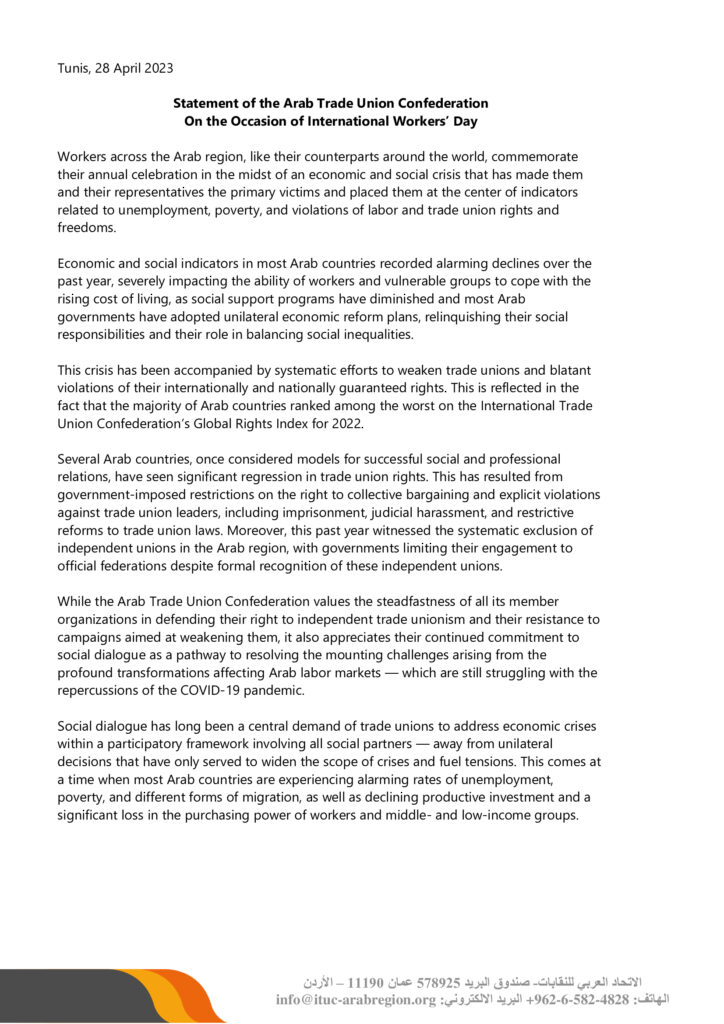Tunis, 28 April 2023
Workers across the Arab region, like their counterparts around the world, commemorate their annual celebration in the midst of an economic and social crisis that has made them and their representatives the primary victims and placed them at the center of indicators related to unemployment, poverty, and violations of labor and trade union rights and freedoms.
Economic and social indicators in most Arab countries recorded alarming declines over the past year, severely impacting the ability of workers and vulnerable groups to cope with the rising cost of living, as social support programs have diminished and most Arab governments have adopted unilateral economic reform plans, relinquishing their social responsibilities and their role in balancing social inequalities.
This crisis has been accompanied by systematic efforts to weaken trade unions and blatant violations of their internationally and nationally guaranteed rights. This is reflected in the fact that the majority of Arab countries ranked among the worst on the International Trade Union Confederation’s Global Rights Index for 2022.
Several Arab countries, once considered models for successful social and professional relations, have seen significant regression in trade union rights. This has resulted from government-imposed restrictions on the right to collective bargaining and explicit violations against trade union leaders, including imprisonment, judicial harassment, and restrictive reforms to trade union laws. Moreover, this past year witnessed the systematic exclusion of independent unions in the Arab region, with governments limiting their engagement to official federations despite formal recognition of these independent unions.
While the Arab Trade Union Confederation values the steadfastness of all its member organizations in defending their right to independent trade unionism and their resistance to campaigns aimed at weakening them, it also appreciates their continued commitment to social dialogue as a pathway to resolving the mounting challenges arising from the profound transformations affecting Arab labor markets — which are still struggling with the repercussions of the COVID-19 pandemic.
Social dialogue has long been a central demand of trade unions to address economic crises within a participatory framework involving all social partners — away from unilateral decisions that have only served to widen the scope of crises and fuel tensions. This comes at a time when most Arab countries are experiencing alarming rates of unemployment, poverty, and different forms of migration, as well as declining productive investment and a significant loss in the purchasing power of workers and middle- and low-income groups.
The Arab Trade Union Confederation, grounded in the principles upon which it was founded, condemns the restrictions and violations faced by trade unions in most Arab countries. While it praises the solidarity shown by trade union organizations around the world, it calls for the development of trade union solidarity into peaceful pressure mechanisms capable of halting the deterioration of trade union freedoms in the Arab region.
On the occasion of the 78th Session of the United Nations General Assembly, to be held this coming September, the Arab Trade Union Confederation calls on all trade union organizations and peace-loving progressive forces to support all efforts aimed at halting wars and divisions in Yemen, Sudan, and Libya, and to stand firmly in solidarity with the just cause of the Palestinian people and workers. It also calls for an end to the ongoing crimes and violations by the occupying authorities and urges the enforcement of international legitimacy, including the Palestinian people’s right to establish their independent, sovereign state with Jerusalem as its capital.
Long live the Arab trade union movement — free, democratic, and independent — in service of workers and for lasting peace in the Arab region.
Executive Secretary
Hind Benammar

